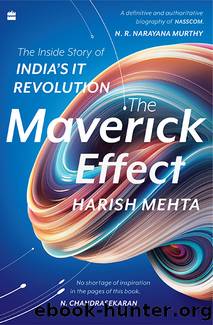The Maverick Effect by Harish Mehta

Author:Harish Mehta
Language: eng
Format: epub
Tags: null
Publisher: HarperBusiness
Published: 2022-08-15T00:00:00+00:00
9
Copyright vs the Right to Copy
âWhat is your problem with piracy?â a career diplomat once chastised me. âLet Indians enjoy it. For centuries, the West has looted this country. Now, it is our turn to reap the fruits of their labour.â This high-profile civil servant later entered politics, was elected to the Parliament and became a lawmaker.
You can easily imagine the attitude India has had towards intellectual property (IP) rightsâbe it copyrights, patents or trademarks.1 On the other hand, at NASSCOM, we were certain that if India failed to secure copyrights, the world would not recognize it as a business-friendly nation, serious about participating in globalization. This was particularly critical to the nascent IT industryâs growth in the late 1980s.
Nevertheless, when we tried to explain this to the government, the response had a simplistic refrain: âIf the Mahabharata and the Ramayana are not copyrighted, why should anything else be?â Even if made in jest, such remarks only revealed the magnitude of our problem. Let alone explaining the benefits of IP protection, we would have to begin by defining it first.
Indiaâs intellectual property rights (IPR) mess affected all kinds of industries. In the 1980s and 1990s, it was common to buy a blank cassette and pay the neighbourhood record store for a mixtape. No one realized copyright was being violated, and they were stealing from the musicians they so adored. Movie theatres in smaller towns played pirated prints. These copies were shot off the screen, with a camera smuggled into a ticketed show. Some of these even got redistributed on VHS tapes and CDs. Most college campuses had photocopy shops selling pirated prints of textbooks, often only chapters relevant to the semesterâs syllabus. Sharing a bookâs pirated copy was as honoured as the noble act of âsharing knowledgeâ, instead of the theft that it was. (Itâll be ironic if youâre reading this on a shared PDF.)
The world over, piracy springs from unavailability or unaffordability. I believe, unlike other places, India has deeper reasons for disrespecting IPR. In my experience, Indians do not like to pay for the intangible. Things like advice from chartered accountants or lawyers are included in this list. Unless they make a brand for themselves, both professions were very poorly paid in India. Another intangible product, literature, suffered, too. Well into the twentieth century, Hindi writers were called munshi (clerk). This is because their creative effort was, in the minds of consumers, reduced to the simple, mechanical act of writing it all down, like a clerk would. Most writers were seen as merely recording existing oral knowledge. For thousands of years, knowledge-sharing in India has been collective, free and altruistic. Further, it has always been passed down to subsequent generations orally. The documentation of knowledge did not start happening till there were printing presses. Even revered teachers and saints like Shankaracharya did not charge any money for their parables. How was it then that we, as Indians, would pay our munshis? Naturally, piracy saw a spurt when this
Download
This site does not store any files on its server. We only index and link to content provided by other sites. Please contact the content providers to delete copyright contents if any and email us, we'll remove relevant links or contents immediately.
Life 3.0: Being Human in the Age of Artificial Intelligence by Tegmark Max(5558)
The Sports Rules Book by Human Kinetics(4386)
The Age of Surveillance Capitalism by Shoshana Zuboff(4292)
ACT Math For Dummies by Zegarelli Mark(4048)
Unlabel: Selling You Without Selling Out by Marc Ecko(3662)
Blood, Sweat, and Pixels by Jason Schreier(3624)
Hidden Persuasion: 33 psychological influence techniques in advertising by Marc Andrews & Matthijs van Leeuwen & Rick van Baaren(3565)
The Pixar Touch by David A. Price(3438)
Bad Pharma by Ben Goldacre(3427)
Urban Outlaw by Magnus Walker(3395)
Project Animal Farm: An Accidental Journey into the Secret World of Farming and the Truth About Our Food by Sonia Faruqi(3221)
Kitchen confidential by Anthony Bourdain(3089)
Brotopia by Emily Chang(3054)
Slugfest by Reed Tucker(3002)
The Content Trap by Bharat Anand(2924)
The Airbnb Story by Leigh Gallagher(2854)
Coffee for One by KJ Fallon(2636)
Smuggler's Cove: Exotic Cocktails, Rum, and the Cult of Tiki by Martin Cate & Rebecca Cate(2540)
Beer is proof God loves us by Charles W. Bamforth(2461)
